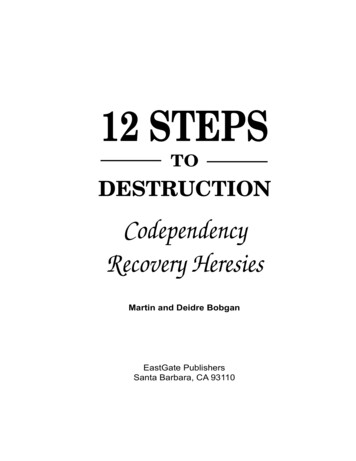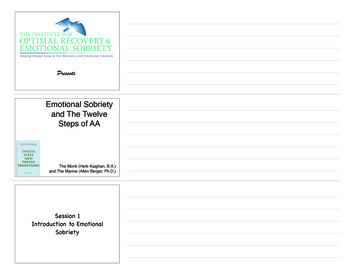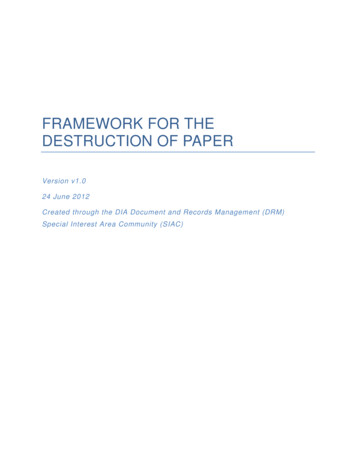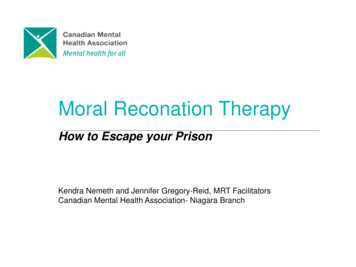
Transcription
12 STEPSTODESTRUCTIONCodependencyRecovery HeresiesMartin and Deidre BobganEastGate PublishersSanta Barbara, CA 93110
All Scripture quotations in this book, unless noted otherwise,are from the Authorized King James Version of the Bible.12 Steps to DestructionCodependency/Recovery HeresiesCopyright 1991 Martin and Deidre BobganPublished by EastGate Publishers4137 Primavera RoadSanta Barbara, California 93110Library of Congress Catalog Card Number 91-72638ISBN 0-941717-05-4All rights reserved.Printed in the United States of America
This is our fourth volume on which Dr. Jay Adams hasbeen kind enough to make theological and editorial comments. We appreciate his willingness to help and thankhim for his encouragement over the years.We are grateful to all our friends who have prayed forus, encouraged us, and sent us helpful research items. Wealso thank Rick Miesel for proof-reading our galleys.God created man in his own image, in the image of Godcreated He him: male and female created He them.Man refers to all humans in Genesis 1:27. The wordman has been used to refer to humanity and he has beenthe pronoun used to refer to a person (male or female) inthe generic sense. Therefore, we use the pronoun hethroughout this book, even though the people referred toin many places are mainly women.
Table of Contents1. And Codependency for All --------------------------- 72. And Her Name Is Codependence ---------------- 193. Love Misunderstood and Misapplied ----------- 474. Twelve-Step Programs: Sin or Sickness? ----- 755. Twelve-Step Religions ------------------------------ 996. Twelve-Step Idolatry ------------------------------ 1237. Here’s Looking at Me ----------------------------- 1438. Judging by What Standard? -------------------- 1719. Sinful Substitutes ---------------------------------- 19710. Commitment to Recovery ------------------------ 21711. Religions of Recovery ----------------------------- 229Notes - 251
1AND CODEPENDENCYFOR ALL. . . .Thousands of people are flocking to the bookstores toread about “codependency.” Most of them are women. Theyread books that describe the symptoms, join self-help groups,and seek therapy to find out if they are “codependent.” Theyenter an endless cycle in hopes of curing their newly discovered “disease,” and they find they are not alone. In fact, thereseems to be an epidemic of self-diagnosed, group-diagnosed,and therapist-d7iagnosed “codependents.” The list of symptoms is so long and the possibilities so wide that everyone inany kind of unsatisfactory relationship may conceivably belabeled “codependent.”The codependency/recovery movement is one of the newest and largest offshoots of the addiction treatment industryand the Alcoholics Anonymous Twelve-Step program. Everyweek 500,000 self-help meetings are held in this country.The fastest growing of these “free, confessional meetings” isCo-dependents Anonymous.1 There are over 1800 Co-dependents Anonymous groups in this country, as well as otherself-help groups, such as Adult Children of Alcoholics (ACOA)and Al-Anon.2 There are also numerous workshops, conferences, treatment centers and therapists. And it must beadmitted that the professionals are glad to have the business. One writer who contends that “the vicious cycle of co-7
812 Steps to Destructiondependency can only be stopped through intervention andprofessional care,” declared in 1984: “Happily, our professionis on the cutting edge of making co-dependency a nationalissue, both on the social level and on the health level.”3 Indeed,the awareness level has reached new heights of popularityand expanded revenues. And as the world goes, so goes thechurch in this newest rage of psychoheresy. Not to be outdone,many psychologists, psychiatrists, and treatment centersoffer the same theories and therapies under the guise of beingbiblical. And churches are joining ranks with Twelve-Stepaddiction and codependency/recovery programs.The estimated numbers of supposedly afflictedcodependents range from tens of thousands4 to 40 million5to 100 million6 and upwards to 96% of the population.7 Thatlast estimate is a bit high when one considers that most ofthe people who are labeled “codependent” are women. Butsuch numerical inconsistencies do not seem to bother theexperts in the field. John Bradshaw, a leading recovery guru,claims that “Codependency is a plague upon the land.” Hedramatically adds, “The Black Plague doesn’t even compareto the ravages of our compulsions caused by codependency.”8Considering how many people are attempting to copewith unsatisfactory relationships and difficult situations, thepotential market for self-help books and codependency/recovery treatment is astronomical. The list of books oncodependency/recovery swells along with those dealing withaddictions. They are popular best-sellers in Christian bookstores as well as in general bookstores. Evidently somethingis there. Something is wrong. People are looking for answers.Suggested remedies and supposed cures lie hidden in thebooks. But are those remedies the kind that Jesus offers?Are the so-called cures consistent with the Word of God?Serious Problems with Problem SolutionsPeople are attempting to address serious problems. Someare suffering in relationships that have little or no resemblance to the kind of love demonstrated and taught in theBible. Numerous people are entangled in their own destructive sinful habits and in the life-dominating sins of those
And Codependency for All. . .9around them. Relationships that are supposed to reflect thelove relationship of Christ and His church may indeed moreresemble a macabre dance of death.Yes, there are serious problems. However, we questionthe diagnoses, answers, formulas and systems that are beingoffered in the name of help, in the name of love, and even inthe name of Christ. Beneath many programs that purportto be Christian lurk ideas, philosophies, psychologies, andreligious notions that are antithetical to biblical Christianity. Codependency/recovery books, groups, programs, andtherapists attempt to rescue people from what they believeto be unhealthy relationships. They give so-calledcodependents strategies to empower the self, build selfesteem, emotionally separate from others, and focus on theirown feelings, ideas and desires.Most systems of codependency and addiction recoveryare based upon various psychological counseling theories andtherapies and upon the religious and philosophical teachings of Alcoholics Anonymous (AA). In short, such programsare based upon the wisdom of man and the worship of falsegods. While the Bible may be used, it is not used in its fullness nor as solely sufficient for all matters of life and conduct.Instead, the Bible is placed in a subservient role to supportpopular psychological theories, therapies, and techniques.Furthermore, God is repeatedly redefined according to thelimited understanding of human beings.Besides serious theological problems inherent in thecodependency and addiction recovery movement, there aremany questions about the effectiveness of such programsand about the high rate of recidivism. We will be citingresearch which shows that faith in recovery programs ismisplaced because of their lack of proven effectiveness. Thereis no scientific reason to add the philosophies and psychologies of the recovery movement to the principles and promises in the Bible. And there are strong theological reasonsnot to.In voicing our concerns we are not minimizing the problems being addressed. Instead, we believe the problems areeven more serious than any of the propagators of popular
1012 Steps to Destructionprograms and systems of help realize. While such programsaim at helping a person solve certain problems and unsatisfactory patterns of living, we must remember that there areeternal consequences.In this book we will look at relationships in dire need ofrepair, at habitual attitudes and behaviors that characterize those who are now calling themselves “codependent,” andat the remedies and religious ideas offered through TwelveStep recovery programs, therapy, and self-help books. Andwe will contrast them with what the Bible says. The purposeof this book is to point out the dangers of popularcodependency and addiction recovery programs in order toencourage both Christians and nonChristians to turn to theWord of God and the work of the Holy Spirit in the midst ofproblems. Our hope is that those caught in the riptide ofhabitual, life-dominating sin might find Jesus Himself sufficient for overcoming the power of sin. Jesus said, “I am comethat they might have life, and that they might have it moreabundantly” (John 10:10).Our ConcernAs in our previous books, our concern is with the opinions of men which take precedence over the Word of God inexplaining why people are the way they are and how theychange. Authors of books on codependency/recovery base theirideas on unproven psychological theories and subjectiveobservations which are based on neither the rigors of scientific investigation nor the rigors of exegetical Bible study.The field of addiction and codependency treatment is filledwith human opinions on the nature of man, how he is to live,and how he changes. Christian treatment centers, recoveryprograms, and books on addiction and codependency are alsobased upon the same flimsy foundation of psychological opinion rather than on science or the Bible.Jesus came to give life and liberty to all who are in bondage. He said:The Spirit of the Lord is upon me, because he hathanointed me to preach the gospel to the poor; he hathsent me to heal the brokenhearted, to preach deliver-
And Codependency for All. . .11ance to the captives, and recovering of sight to the blind,to set at liberty them that are bruised, to preach theacceptable year of the Lord (Luke 4:18).Jesus preached the gospel to those who were poor in spirit,who were cast down, who were discouraged, who hadexhausted their means of coping with life, and who realizedthey were destitute. He came “to heal the brokenhearted,”those whose dreams have turned to despair and whose lovehas been fused with pain and disappointment. Jesus cameto preach deliverance to those in bondage to sin, to themselves, to other people, and to life-crippling habits. He cameto give sight to those blinded by the wisdom of men and theenemy of their souls. Jesus came to set at liberty those whohave been bruised by the world, the flesh and the devil.Who is not included among those who are in desperateneed of the Savior? Indeed, all who find themselves caughtin the wreckage of their lives and who are now turning toaddiction and codependency/recovery programs need Jesusmore than anything or anyone else. Therefore the questionmust be asked: If Jesus is truly the answer to life’s problemsand indeed the very source of life, why are both nonChristiansand Christians looking for answers elsewhere?If Jesus Is the Answer, Why Look Elsewhere?NonChristians turn to the vast recovery movementbecause the programs offer hope, help, and promises ofrecovery. And there is no encouragement to believe in theGod of the Bible, whom they have never understood or known.They don’t turn to Christ because they have accumulatedplenty of reasons not to. They remind themselves of Christians who have failed. Some have heard pastors say whatthey didn’t want to hear. Furthermore, they cannot understand a God who might condemn anyone or offer such anarrow way. However, beyond all of the human excuses, theactual reason nonChristians do not turn to Christ is becausetheir eyes and ears are closed to the merciful grace of God.But why do Christians look for answers outside the Bibleand their relationship with Jesus Christ? Paul wrestled withthis problem in his letter to the Galatians. The Galatians
1212 Steps to Destructionhad started out well in the Christian walk, but then, underthe influence of the Judaizers, they lost confidence in thesufficiency of the gospel. In his salutation Paul reminds themof what Jesus had already accomplished for them:Grace be to you and peace from God the Father, andfrom our Lord Jesus Christ, who gave himself for oursins, that he might deliver us from this present evilworld, according to the will of God and our Father: towhom be glory for ever and ever. Amen. (Galatians 1:35.)Then Paul presents his concern:I marvel that ye are so soon removed from him thatcalled you into the grace of Christ unto another gospel:Which is not another; but there be some that troubleyou, and would pervert the gospel of Christ (Galatians1:6-7).The Galatians were attempting to be justified by the worksof the law rather than by faith in what Jesus had accomplished for them by dying in their place and giving themnew life through His resurrection. And this is true today.Paul admonishes them and all who fall into this error:O foolish Galatians, who hath bewitched you, that yeshould not obey the truth, before whose eyes JesusChrist hath been evidently set forth, crucified amongyou? This only would I learn of you, received ye theSpirit by the works of the law, or by the hearing offaith? Are ye so foolish? Having begun in the Spirit,are ye now made perfect by the flesh? (Galatians 3:13.)In adding requirements, they entered into bondage. Theyevidently did not understand that just as they were savedthrough faith in the finished work of Christ, they were tolive by faith in the finished and ongoing work of Christ inthem. Therefore Paul reminds them and us: “But that noman is justified by the law in the sight of God, it is evident:for, the just shall live by faith” (Galatians 3:11).
And Codependency for All. . .13People confuse the works of the law with the works offaith. Works of the law undermine a person’s ability to pleaseGod, because they are limited to self-effort. Works of faith,however, are the fruit of faith that grow from the Holy Spiritwho indwells and empowers believers to obey and pleaseGod. Trying to keep the law by way of the flesh leads to bondage and death, because no one can keep the law. The way ofthe Spirit is freedom to please God and leads to life eternal.Just as the Galatians, some Christians start out welland then shift into works. They lose confidence in the efficacy of the gospel and the Holy Spirit. When they sin, theymay admonish themselves and try to change through tryingharder, rather than responding through faith (1 John 1:9).Or, when they sin, they may not think it really matters thatmuch since they already have the righteousness of Christ.One slips off course by trying to do it on his own, and anotherdoesn’t bother to obey. Both responses lead to disaster andbondage; both are bondage to the world, the flesh, and thedevil. Therefore Paul presents the solution to both errors:Stand fast therefore in the liberty wherewith Christhath made us free, and be not entangled again withthe yoke of bondage. . . . For, brethren, ye have beencalled unto liberty; only use not liberty for an occasionto the flesh, but by love serve one another. . . This I saythen, walk in the Spirit, and ye shall not fulfil the lustof the flesh. (Galatians 5:1, 13, 16.)Just as Christians are saved by grace through faith, theyare to walk by grace through faith. The very source of walking in the Spirit comes through the profound relationship ofthe believer to the Lord Jesus Christ.Another reason why some who call themselves Christians may be looking for some program in place of (or inaddition to) Christ is that they have misunderstood the gospeland what it entails. The gospel might not have been presentedclearly. Rather than recognizing their need for a savior tosave them from their own sins, they may have been lookingfor a savior who would save them from their circumstancesand/or who would make life easy and pleasant. They may
1412 Steps to Destructionhave misunderstood the need to die to self and thought thatJesus was there to make them feel better about themselves,build their self-esteem, and cater to their desires. While Jesusmeets every true need for the believer, and while life in Himholds a marvelous new dimension of peace with God and thehope of eternal life, all problems do not simply vanish. Jesusbeing the answer to problems of living does not mean thatHe necessarily takes them away. He gives strength andpurpose, and He even uses problems to make a believer morelike Himself. Three well-known sections of Scripture speakto this issue: Rom. 5:1-5; Rom. 8:28-29; and 1 Cor. 10:13.Christians who expect God to take away problems andchange circumstances may begin to think poorly of God andeven begin to blame Him for allowing bad things to happen.They may resent God for letting them down. Those feelingscome from a misunderstanding of the character of God, thesinful condition of man, and the influence of “the prince ofthe power of the air” on the circumstances of this world.Rather than getting angry with God or forgiving Him, whichsome wrongfully teach, Christians who have an erroneousview of God need to have their vision restored by the Word ofGod and the work of the Holy Spirit. God is holy, pure, righteous, and full of compassion and mercy. He has providedsalvation for the lost through the death of His only begottenSon. And He fulfills all His promises.The Psychological Way or the Spiritual Way?Another fundamental reason why Christians are turning to recovery programs is that they believe psychologicaltheories about the nature of man. The encroachment of thepsychological way into Christianity has been a subtle, gradualmovement which began in the world and moved into seminaries and pastoral counseling classes. Liberal denominations became psychologized much earlier than conservativeones. Pastors were concerned about their parishioners seeking help outside the fold and turned to the wisdom of men tominister to souls.9 Unfortunately many learned just enoughto be intimidated and to think themselves incapable ofministering to people with “psychological” problems. Also, a
And Codependency for All. . .15number of evangelical Christians who had become psychologists worked to convince church leaders that psychologicaltheories and therapies are necessary for helping Christians.It is disheartening to see conservative churches, denominations, and fellowships running after psychological theories and therapies and acting as if Jesus Christ is not enough,as if the Holy Spirit indwelling a believer is impotent, ornearly so, and treating the Word of God as only useful forminor problems or theological questions. Instead of searching the Scriptures and warning their sheep, too many pastorsbelieve two lies: (1) that they can only deal with spiritualmatters (with a very limited definition) and (2) that onlythose who are psychologically trained are equipped to dealwith psychological matters (which virtually includes everything about understanding the nature of man and how tohelp him change).The church increasingly reflects a society which is saturated with the kind of psychology that seeks to understandwhy people are the way they are and how they change.Psychological language is part of everyday language andpsychological solutions are accepted as life’s solutions.Concerning the codependency/recovery movement, Dr. RobertColes says, “You don’t know whether to laugh or cry oversome of this stuff.” He says this movement is a “typicalexample of how anything packaged as psychology in thisculture seems to have an all too gullible audience.”10Dr. John MacArthur, in his book Our Sufficiency In Christ,warns:Human therapies are embraced most eagerly by thespiritually weak—those who are shallow or ignorantof biblical truth and who are unwilling to accept thepath of suffering that leads to spiritual maturity anddeeper communion with God. The unfortunate effectis that these people remain immature, held back by aself-imposed dependence on some pseudo-Christianmethod or psychoquackery that actually stifles realgrowth.11
1612 Steps to DestructionMany Christians do not realize that the psychologicaltheories, therapies, and techniques used by Christians werecreated by nonChristians, many of whom repudiated andopposed Christianity. MacArthur says that even though theword psychology means “the study of the soul,” psychology“cannot really study the soul.” He says:Outside the Word and the Spirit there are no solutionsto any of the problems of the human soul. Only Godknows the soul and only God can change it. Yet thewidely accepted ideas of modern psychology are theories originally developed by atheists on the assumption that there is no God and the individual alone hasthe power to change himself into a better personthrough certain techniques.12Christians use the same theories, therapies, andtechniques as secular psychological counselors and psychotherapists. Many Christians mistakenly believe that suchtheories are science, when in fact they are simply unproven,unscientific notions of men. The part of psychology whichdeals with the nature of man, how he should live, and howhe should change is filled with contradictions and deceptions. Moreover, because those theories deal with thenonphysical aspects of the person, they intrude upon thevery essence of biblical doctrines of man, including his fallencondition, salvation, sanctification, and relationship of loveand obedience to God. Christians who embrace the psychological opinions of the world have moved from absoluteconfidence in the Word of God for all matters of life andconduct to faith in the unproven, unscientific psychologicalopinions of men. And this move in faith has led many intothe popular recovery movement with its numerous psychologically-based treatment programs.The Gospel or Twelve Steps?What is the answer to the vast problems that are beingaddressed by the addiction and codependency recovery movement? Is it the good news of Jesus Christ or is it some versionof Twelve-Step recovery and/or psychological treatment
And Codependency for All. . .17programs? The biblical answer is Jesus Christ and Himcrucified:For I am not ashamed of the gospel of Christ: for it isthe power of God unto salvation to every one thatbelieveth; to the Jew first, and also to the Greek. Fortherein is the righteousness of God revealed from faithto faith: as it is written, the just shall live by faith.(Romans 1:16-17.)Jesus Christ enables people to be free to please and serveGod. Jesus said: “I am the way, the truth, and the life: noman cometh unto the Father, but by me” (John 14:6). TwelveStep recovery programs and psychological treatmentprograms are based upon the wisdom of men. Most promisethe ability to please and serve self and others. But they cannotplease God, because they are not of Him (Romans 8:8). Whilethey may free a person from one kind of bondage, they leadinto another: bondage to self and even bondage to the “princeof this world.”This book is written for those who are suffering from thetrials of life and for those who want to help. This book is forall who are thinking about joining a recovery group or entering a treatment center for addiction or codependency. It isfor those who have tried Twelve-Step programs and recovery treatment centers and found them lacking. It is also forthose who are currently in such programs. And, finally, it isto encourage those professing Christians who offer suchprograms to return to the faith once delivered to the saints.A New Religion?Through the language of addiction and recovery, Christians are being enticed into a totally different belief systembased on psychological foundations. MacArthur warns:There may be no more serious threat to the life of thechurch today than the stampede to embrace thedoctrines of secular psychology. They are a mass ofhuman ideas that Satan has placed in the church as ifthey were powerful, life-changing truths from God.13
1812 Steps to DestructionInstead of following the Great Commission to “teach all nations. . . to observe all things whatsoever I [Jesus] have commanded you” (Matthew 28:19-20), Christians are teachingand embracing a psychological religion of recovery. The shiftis subtle but swift. Throughout this book we attempt to shedlight on the differences between the popular teachings ofthe recovery movement and “the faith which was once delivered unto the saints” (Jude 3). Because these faith systemsare antithetical to each other, the attempt to merge the psychological, codependency/recovery teachings with the Bibleand Christianity results in one big psychoheresy.
2AND HER NAME ISCODEPENDENCEWhat Is Codependency?What is this thing called “codependency”? Who iscodependent? Definitions vary. Melody Beattie, the shiningstar of the “codependent-no-more” movement, confesses thatdefinitions of the terms codependent and codependency“remain vague.”1 Definitions vary from one person to thenext, depending upon one’s theoretical orientation.The word codependent was first used in the late 1970s todescribe those people “whose lives had become unmanageable as a result of living in a committed relationship with analcoholic.”2 In looking at the early usage of the termcodependent, Robert Subby and John Friel say:Originally, it was used to describe the person or personswhose lives were affected as a result of their beinginvolved with someone who was chemically dependent.The co-dependent spouse or child or lover of someonewho was chemically dependent was seen as havingdeveloped a pattern of coping with life that was nothealthy, as a reaction to someone else’s drug or alcoholabuse.3Elizabeth Kristol, an associate editor at the Ethics and PublicPolicy Center in Washington, D.C., says:19
2012 Steps to Destruction. . . the term codependent has shifted from its originallimited meanings: one who was married or related toan addict and therefore was affected by his behaviorand in unintended ways was complicit in the addiction. In contrast, the latest definitions ofcodependency are so broad as to be all-encompassing.4 (Emphasis added.)Anne Wilson Schaef, in her book Co-Dependence Misunderstood-Mistreated, says that:. . . everyone who works with, lives with, or is aroundan alcoholic (or a person actively in an addictive process)is by definition a co-dependent and a practicing codependent. This includes therapists, counselors,ministers, colleagues, and the family.5 (Emphasis hers.)Expanded definitions range from including those in theenvironment of a substance abuser to vague definitions thatinclude everyone. Subby defines codependency as:An emotional, psychological, and behavioral conditionthat develops as a result of an individual’s prolongedexposure to, and practice of, a set of oppressive rules—rules which prevent the open expression of feeling aswell as the direct discussion of personal and interpersonal problems.6Those who follow the teachings of Virginia Satir’s FamilySystems would identify a codependent as being any memberof a so-called dysfunctional family. This would thereforeinclude all children of less-than-perfect parents. DavidTreadway says:Until relatively recently, codependency was simply aterm used in the substance abuse field to describe theenabling behavior of the typical spouse of an alcoholic.But all of a sudden, being codependent is fashionable. . . Currently, codependency is loosely used to describethe caretaking member of any complementary couplerelationship. Sometimes it seems as if anyone who
And Her Name Is Codependence21subordinates his or her own needs to take care of othersmight be labeled codependent.7Dr. Thomas Szasz reveals the ridiculous implications ofthe term codependence. He says:Suppose the daughter of a man with angina or cancercolludes with her father in denying his illness andavoiding treatment for it: Does that make her “coanginal” or “co-cancerous”?8Certain characteristics or behaviors enter into the definitions. For instance, one definition of codependency is: “apsychological condition characterized by a preoccupation withanother person and his problems, hindering one’s ability todevelop healthy relationships with people.”9Another definition centers on control. The life-dominating sin of one person can also dominate a close family member.However it is the codependent who is accused of controlling.Beattie says:A codependent person is one who has let anotherperson’s behavior affect him or her, and who is obsessedwith controlling that person’s behavior.10The Christian authors of Love Is a Choice echo Beattie. Theysay:Codependency is the fallacy of trying to control interior feelings by controlling people, things, and eventson the outside.11This is not only a definition; it is also an assumption aboutwhat’s going on inside.The idea of compulsive behavior also enters into the definition of codependency. The working definition at the firstnational conference on codependency (1989) used this definition:Codependency is a pattern of painful dependence oncompulsive behaviors and on approval from othersin an attempt to find safety, self-worth, andidentity.12(Emphasis added.)
2212 Steps to DestructionPat Springle, another Christian author, says in his bookCodependency:Most psychologists define codependency as an inordinate and unhealthy compulsion to rescue and takecare of people. . . . Rescuing, caretaking, and controlling are the central characteristics of the problem, butit usually has other contributing characteristics as well,such as hurt, anger, guilt, and loneliness.13 (Emphasisadded.)Here codependency is defined as compulsion. The psychological definition of compulsion is “a psychological state inwhich an individual acts against his own will or consciousinclinations.”14 Therefore these definers must be saying thatpeople rescue and take care of others against their own willor “conscious inclinations.” The implication is that this compulsion arises from a motivating unconscious, which is aFreudian invention.Another psychological definition of the word compulsi
8 12 Steps to Destruction dependency can only be stopped through intervention and professional care,” declared in 1984: “Happily, our profession is on the cutting edge of making co-dependency a national issue, both on the social level and on the health level.” 3 Indeed, the awar










